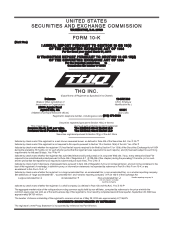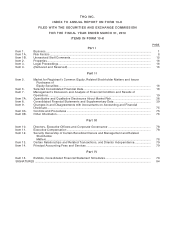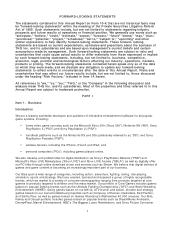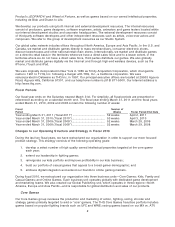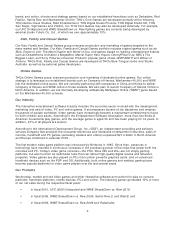THQ 2010 Annual Report Download - page 17
Download and view the complete annual report
Please find page 17 of the 2010 THQ annual report below. You can navigate through the pages in the report by either clicking on the pages listed below, or by using the keyword search tool below to find specific information within the annual report.9
We must continue to develop and sell new titles in order to generate net sales and remain
profitable.
We derive almost all of our net sales from sales of interactive software games. Even the most successful
video games remain popular for only limited periods of time, often less than six months, and thus the success
of our business is dependent upon our ability to continually develop and sell successful new games.
Because net sales associated with an initial product launch generally constitutes a high percentage of the
total net sales associated with the life of a product, the inability of our products to achieve significant market
acceptance, delays in product releases or disruptions following the commercial release of our products may
have a material adverse impact our net sales and profitability.
Our business i s “hit” driven. I f we do not deliver “hit” games , our net sales and profi tability can
suf fer.
While many new products are regularly introduced, only a relatively small number of “hit” titles account for a
significant portion of video game sales. If we fail to develop “hit” titles, or if “hit” products published by our
competitors take a larger share of consumer spending than we anticipate, our product sales could fall below
our expectations, which could negatively impact both our net sales and profitability.
Ongoing uncertaint y regarding the duration and extent of the recent economic downturn could
result in a reduction in discretionary spending by consumers that could reduce demand for our
product s.
Our products involve discretionary spending on the part of consumers. Consumers are generally more willing
to make discretionary purchases, including purchases of products like ours, during periods in which favorable
economic conditions prevail. As a result, our products may be sensitive to general economic conditions and
economic cycles. A continuation or worsening of current, adverse worldwide economic conditions, including
declining consumer confidence, inflation, recession and rising unemployment may lead consumers to delay or
reduce purchases of our products. Reduced consumer spending may also require us to incur increased
selling and promotional expenses. A reduction or shift in domestic or international consumer spending could
negatively impact our business, results of operations and financial condition.
We may not be able to adequately adjust our cos t st ructure in a t imely fashion in response to a
sudden decrease in demand.
A significant portion of our selling and marketing and our general and administrative expense is attributable
to expenses for personnel and facilities. In the event of a significant decline in net sales, we may not be able
to dispose of facilities, reduce personnel or make other changes to our cost structure without disruption to
our operations or without significant termination and exit costs. Management may not be able to implement
such actions in a timely manner, if at all, to offset an immediate shortfall in net sales and profit. Moreover,
reducing costs may impair our ability to produce and develop software titles at sufficient levels in the future.
We have significant net operating loss and tax credit carryforwards (“N OLs”). I f we are unable to
use our N OLs, our future profi tability may be si gnificantly impacted.
As of March 31, 2010, we had federal net operating loss carryforwards of $353.8 million and federal R&D tax
credit carryforwards of $24.5 million. Under applicable tax rules, we may “carry forward” these NOLs in certain
circumstances to offset any current and future taxable income and thus reduce our income tax liability,
subject to certain requirements and restrictions. Therefore, we believe that these NOLs could be a
substantial asset. However, if we experience an “ownership change,” as defined in Section 382 of the
Internal Revenue Code, our ability to use the NOLs could be substantially limited, which could significantly
increase our future income tax liability. An “ownership change” generally is deemed to occur if our “5-percent
shareholders” increase their aggregate percentage ownership of our stock by more than 50 percentage
points over the lowest percentage of our stock owned by these 5-percent shareholders at any time during
the three-year period prior to any such increase in ownership. While the rules for identifying 5-percent
shareholders and their ownership are quite complex, 5-percent shareholders generally include persons that
own, at any time during the three-year testing period, 5% or more of our stock directly, as well as by
attribution from other persons, and certain groups of stockholders, each of whom owns less than 5% of our
stock. On May 12, 2010, we entered into a Section 382 Rights Agreement with Computershare Trust
Company, N.A., as rights agent, in an effort to prevent an “ownership change” from occurring and thereby
protect the value of the NOLs. There can be no assurance, however, that the Section 382 Rights Plan will


